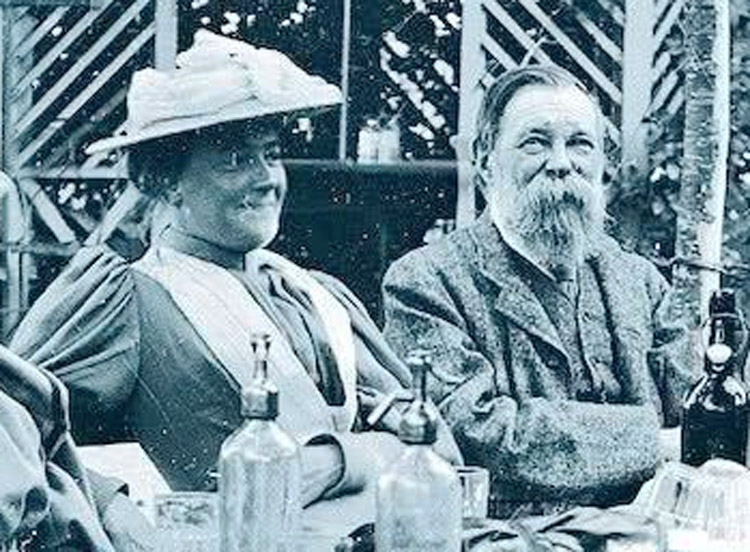This week’s selection from October Books of the Month is The Origin of the Family, Private Property, and the State by Frederick Engels, first published in 1884. Engels was the lifelong political collaborator of Karl Marx in founding the modern international communist movement. The excerpt is from the introduction by Evelyn Reed, author of Woman’s Evolution and other works developing Engels’ pioneer work. Engels showed how the oppression of women begins with the development of private property, and the emergence of the modern working class creates the basis to end that oppression. Copyright © 1972 by Pathfinder Press. Reprinted by permission.
Although some uncertainty remains on the exact time scale of these three epochs, they can be approximately measured as follows: Savagery began with the emergence of the first humans (or hominids) from our ancestral branch of the anthropoids about a million years ago. Barbarism came in about eight thousand years ago, and gave way to the first urban populations from Egypt through Mesopotamia and India to China. The Greek and Roman city-states of some three thousand years ago represent the beginning of Western civilization. The period of savagery, therefore, was by far the longest epoch, lasting for more than 99 percent of human existence on earth, while the two later periods of barbarism and civilization together cover less than one percent.
But the pioneer anthropologists did more than disclose this uneven tempo of progress. They discovered that primitive society was different from civilized society in every major respect. Engels shows in his book how and why they were opposite socioeconomic systems. Civilized society is founded on the private ownership of property; it is class divided, with a wealthy possessing class exploiting the working mass. A state apparatus enforces this rule of the rich. It is characterized by inequalities of all kinds, economic, social, and sexual. Male supremacy and female inferiority are integral features of this patriarchal class system.
Savage society, on the other hand, was based upon the collective ownership of the means of production, cooperative social relations, and complete equality in all spheres of life, including sexual equality. Due to the absence of private property, such key institutions of the private-property system as the state and the patriarchal family were nonexistent. Tribal society was a self-governing community in which the elected chiefs claimed no superiority to any other members.
There was no compulsory family institution with the father in command, exacting subservience, obedience, and conformity from wife and children, any more than there was a coercive state apparatus. Savage society was founded upon the cardinal principles of liberty and equality for all; it was a sisterhood of women and a brotherhood of men in a tribal commune which [Lewis] Morgan and his cothinkers called a system of “primitive communism.” One of its most striking features was the influential and esteemed position of women. …
These disclosures indicate that a drastic social change occurred in the transition from savagery to civilization, that is, in the period of barbarism. Although this process has yet to be studied in depth, it is clear that hidden in the period of barbarism a major social and sexual changeover took place. The structure of society became transformed from an equalitarian commune to an oppressive class system serving the interests of private property; and women fell from their former high position in the primitive commune to a degraded status in civilized patriarchal society.
This momentous transformation did not occur in one stride but gradually, over some five thousand years of the barbaric period. In the first agricultural stage, although the tribal system was beginning to break up into village communities and farm families, the communal relations inherited from the past continued on and women still retained their influential position. In fact, it was precisely in the first agricultural period that women reached the apex of their prestige; they appear now in the various guises of Earth Mother, Goddess of Fertility, and the like. … It was at the peak of this matriarchal development, in the first stage of barbarism, that women’s downfall proceeded side by side with the decline of the social system that bears their name.
This came about through the rise of private property and the unleashing of new social forces that gained ascendancy in the later stages of barbarism. With the advent of civilization and class society, the twin changes were consummated: the private-property system was victorious and women plummeted from their former high status to become the oppressed sex of patriarchal society.
The exceptional value of Engels’s exposition is that he links together these two epoch-making developments. He clarifies the causes and consequences of the social upheaval that gave the wealthy class its exploitative power over the working people and in the same process brought about the “historic defeat” of the female sex. …
The renewed interest of women in his book is also a tribute to the value of the author’s Marxist method. The outstanding merit of Engels’s exposition is that he shows the real historical causes behind the catastrophic downfall of women and thereby illuminates the road ahead for female emancipation. The oppression of women came into existence for the same reasons and through the same forces that brought private property and class society into existence. It did not exist before that. But as Engels indicates, class society is itself a transitory phenomenon, the product of specific economic conditions at a certain stage of social evolution. It has been — and will be — only a brief interlude in the forward march of humankind. Through further evolution — and socialist revolution — this oppressive system and its degradation of women will be done away with. …
The implication is clear. The replacement of the oppressive system of capitalism by a new order that will remake human relations from top to bottom is the ultimate road to female liberation.


